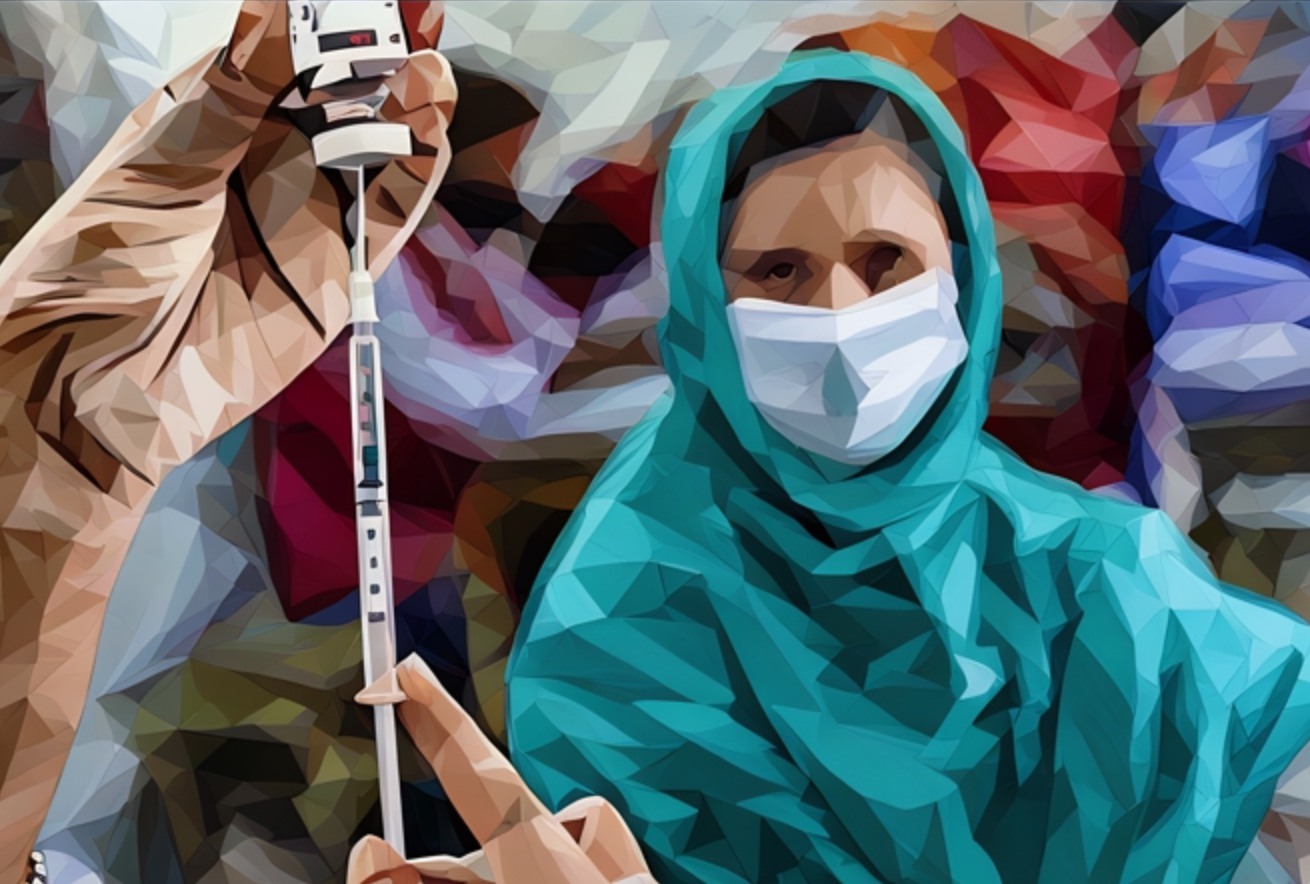Unmasking the crisis: Why Bangladesh needs a full COVID-19 enquiry now

As Bangladesh still faces the repercussions of the COVID-19 pandemic, it is crucial to call for accountability and transparency through a thorough inquiry.
Countries worldwide are examining their pandemic responses, assessing both successes and shortcomings.
Bangladesh must follow suit—investigating not just the accuracy of its reported COVID-19 death toll, but also the policy failures, weaknesses in the health system, and procurement controversies that exacerbated the crisis.
The previous government’s questionable lockdown and social distancing measures, along with allegations of corruption and mismanagement by then-authoritarian Prime Minister Sheikh Hasina and Health Minister Zahid Maleque, highlight the need for careful scrutiny.
Now, as Bangladesh emerges from a regime that manipulated COVID-19 data to safeguard its reputation, it is time to demand accountability through a national inquiry.
For too long, the public was kept in the dark about the true impact of the pandemic—official figures were manipulated, critical health information was withheld, and policies were distorted to project an illusion of control.
Now, with a renewed commitment to transparency following the end of Sheikh Hasina's dictatorial rule, the country must investigate not only the actual death toll and the failures of its health systems but also the corrupt practices and governmental mismanagement that worsened the crisis.
By following the example of the UK’s COVID-19 inquiry, Bangladesh can establish a transparent, independent investigation that ensures lessons are learned rather than forgotten.
The true toll of COVID-19: Revealing the hidden numbers
A key goal of a COVID-19 inquiry should be to address the gap between reported and actual cases and fatalities.
Early in the pandemic, Bangladesh's official figures were alarmingly low compared to those of neighboring countries, raising serious questions about accuracy and transparency.
Many families believe their loved ones' deaths were never recorded as COVID-19 cases, and in rural areas, numerous deaths may have gone unreported entirely.
The inquiry should conduct a thorough review of medical records, hospital data, and death certificates to accurately assess the pandemic's true impact.
This effort is not merely about statistics; it’s about the personal stories of lives lost and families left in uncertainty. A transparent accounting of COVID-19 fatalities would offer closure to families and lay the groundwork for a health system that acknowledges and respects all lives. Only by confronting the true scale of the crisis can Bangladesh begin the process of healing and rebuilding.
Hasina government's patchwork of ineffective policies
During the pandemic, the Hasina government's response was characterized by inconsistency and indecision.
Lockdowns were announced with little notice or guidance, resulting in chaos and confusion. While some restrictions were put in place, exceptions appeared arbitrary, and enforcement was inconsistent.

As a result, social distancing measures were
often ignored, especially in densely populated areas. Markets, public
transportation, and religious gatherings frequently operated with minimal
restrictions, facilitating unchecked virus transmission.
This inconsistency extended to the highest levels of leadership. Hasina’s public statements often contradicted scientific advice, downplaying the severity of the crisis while urging the public to remain calm.
Meanwhile, Minister Maleque repeatedly assured citizens of the health system’s robustness, even as hospitals overflowed and healthcare workers faced critical shortages of equipment.
This lack of cohesion and empathy from the government contributed to widespread public disillusionment and eroded trust in official directives.
An inquiry must investigate these inconsistent and erratic policies, holding leaders accountable for decisions that jeopardized millions of lives.
Bangladesh deserves to know whether public health was prioritized or if political considerations influenced crucial decisions.
A transparent investigation could also clarify the government’s decision-making process, shedding light on how policies were formulated and communicated, as well as why scientific evidence was sometimes overlooked.
Investigation of the dubious role of Beximco in vaccine procurement
One of the most contentious aspects of Bangladesh's pandemic response was the involvement of Beximco Pharmaceuticals in vaccine procurement, which directed significant public funds through a private entity during a national emergency.
Acting as an intermediary between the Bangladeshi government and the Serum Institute of India, Beximco facilitated vaccine purchases at prices that many claim were unnecessarily inflated.
While neighboring countries engaged in direct, government-to-government negotiations for vaccines, Bangladesh’s reliance on Beximco raised concerns about conflicts of interest and a troubling lack of ethical governance.
This controversy is further complicated by the ties between key Beximco figures and the Bangladeshi government.
Salman F Rahman, a major shareholder in Beximco and one of Hasina’s closest advisors, held a powerful position as a private sector development advisor, which allowed him to significantly influence government policies and public funding decisions—raising serious questions about conflicts of interest.
Additionally, Nazmul Hasan Papan, the managing director of Beximco Pharmaceuticals at the time, was also a prominent parliamentarian and influential figure in political circles, as well as the chairman of the cricket board.
Their combined influence, along with Beximco’s crucial role in vaccine negotiations, fuels concerns that the procurement strategy may have prioritized private profits over the public’s best interests.
In the midst of a national health crisis, the apparent blending of corporate interests with government decisions raises serious ethical issues.

An independent inquiry must examine the
specifics of Beximco’s vaccine deals, investigating whether public health was
prioritized or if profit motives influenced key decisions.
Did the arrangement with Beximco lead to unnecessary costs, and was transparency maintained throughout the process? How did the roles of Rahman and Papan affect procurement policies, and were any personal or corporate interests improperly favored?
A thorough investigation is crucial to ensure that future government contracts adhere strictly to principles of transparency and public accountability, rather than prioritizing private profits.
Such an inquiry would set a standard for ethical governance and help restore public trust in the government’s commitment to public health, ensuring that the well-being of the people is prioritized over corporate gain in any future health crises.
Was the healthcare system given ample support?
Bangladesh’s healthcare system, already stretched thin, nearly collapsed under the strain of the pandemic.
Hospitals were overwhelmed, essential supplies like oxygen and ventilators were in short supply, and many facilities had to turn away patients during the peak of the crisis.
Frontline healthcare workers faced harsh conditions, often lacking adequate personal protective equipment (PPE) and receiving limited support from the government.
The system's inability to manage the crisis was not due to the failings of its workers but rather a result of chronic underfunding, insufficient infrastructure, and a lack of emergency preparedness.
An inquiry should investigate these systemic weaknesses and uncover the root causes of the healthcare system’s fragility.
How was emergency funding allocated? What steps were taken to secure medical supplies and equipment, and why did critical shortages continue?
By addressing these questions, Bangladesh can gain insights into the structural reforms necessary to create a resilient healthcare system capable of withstanding future crises.
Enquiries about mismanagement at the top
Effective leadership in a crisis demands empathy, transparency, and a dedication to public welfare. Unfortunately, Hasina and Maleque often appeared disconnected from the struggles faced by ordinary Bangladeshis.
Their management of the crisis demonstrated a lack of foresight and, at times, a concerning indifference to the suffering around them.
Minimal support was offered to the millions who lost their jobs or livelihoods, leaving healthcare workers to navigate the crisis with little guidance from leadership.
Public perceptions of mismanagement and corruption were further fueled by reports of inconsistent and sometimes contradictory public health messages, along with poorly executed lockdowns.

A COVID-19 inquiry should not only
address the logistical failures but also examine the human toll of this lack of
empathy.
By holding these influential figures accountable, Bangladesh can establish a precedent that demands empathy and responsibility from those in power, especially during times of national crisis.
Lessons from the UK’s COVID-19 enquiry
The UK’s ongoing COVID-19 inquiry serves as a model for how a nation can thoroughly evaluate its pandemic response.
Characterized by transparency, the inquiry features open hearings and a steadfast commitment to identifying mistakes and learning from them.
By prioritizing the public interest over political considerations, the UK inquiry is establishing a record of the crisis from which future leaders can draw valuable lessons.
Bangladesh can adopt a similar approach by committing to an independent and transparent inquiry that leaves no aspect unexamined.
This effort is not about assigning blame but about recognizing and correcting errors. By reviewing policies, public health measures, and procurement decisions with transparency and integrity, a Bangladeshi inquiry could yield valuable insights that help prevent similar failures in future health crises.
Why Bangladesh needs this enquiry: A call to action
A COVID-19 inquiry in Bangladesh is not just a retrospective exercise; it is vital for the nation’s future.
Such an investigation could help restore public trust by revealing mismanagement, corruption, and systemic failures that exacerbated the pandemic’s impact.
The people of Bangladesh have the right to know the truth about their government’s handling of this crisis and deserve assurance that, in the future, public health will take precedence over profit or political interests.
This is a critical moment for citizens, civil society, and lawmakers to demand transparency and accountability.
An independent inquiry can ensure that past mistakes serve as lessons, not precedents, guiding Bangladesh toward a future with a robust public health system, accountable leadership, and a resilient, empathetic response to crises.
It is time for Bangladesh to take a stand and commit to learning from its COVID-19 experience through a comprehensive and transparent inquiry. Only then can the nation move forward with the knowledge and reforms necessary to safeguard its people against future challenges.
—
Adil Mahmood is a former journalist

